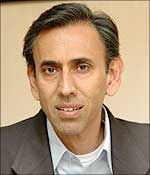|
| Help | |
| You are here: Rediff Home » India » Business » Interviews » Ranjan Sinha, founder, Summit HR Worldwide |
|
Ranjan Sinha is the founder of Summit HR Worldwide. Engaged in human resource and recruitment process outsourcing services, the firm helps companies in the US, Europe and India to hire the 'right people'. A B.Tech from the Indian Institute of Technology, Roorkee and Masters from Wharton School, USA and MBA from Indian Institute of Management, Bangalore, Ranjan Sinha's has been a success story. Summit HR has recently been rated among the top 10 HR outsourcing vendors in the world by the Wall Street Journal and the The Black Book of Outsourcing. Sinha talked to Shobha Warrier about the strides his company has taken in the last one year. When we met in 2006, you had just been named the 'HR Outsourcing Superstar' by HRO Today magazine for you contribution to the HR outsourcing industry. Now, Summit HR has been adjudged as among the top 10 HR outsourcing vendors. How did you achieve this? We were chosen as one of the top 10 companies by Wall Street Journal for various reasons. Basically it has to do with leadership, customer base, growth rate, etc. We hired the right people and then nurtured and developed them. HR and recruitment outsourcing need them more than any other company. Why do you say that HR outsourcing needs right people more than other BPOs? HRO is not just about responding to a caller and reading the script. The people involved must possess a different skill set. Also, you can't afford attrition in an RPO venture since it is in relationship business. At the end of the day, the recruiter is building a relationship with candidates based in the US, Europe and India. Attrition is a major problem that most Indian companies and specially the BPOs face. How do you address it? We do have attrition but compared to the call centres, it is minimal. It is a solvable issue at Summit HR. People do not always leave a company for more money. There is always something else. They anyway end up getting more money when they move. It is important to give your staff the right growth environment. What makes us different is the fact that we have a sophisticated recruitment process. We can teach people skills, knowledge, and best practices of recruitment. Every individual joins a company with certain expectations. We filter people rigorously using a tool from a company called Global Talent Metrics. This allows us to minimise attrition. We are extremely particular about whom we hire, since we cannott afford to lose clients. You have clients in the US, Europe and India. Which is the largest client base? Interestingly, it is slowly shifting to India. Are you worried about the slowing down of the US economy? How is it going to affect the job market? Yes and no. Initially most people came to India to figure out a low cost delivery system. That was the reason Summit HR started operations in India so that we could deliver US based process at a lower cost. In the last 18 months I noticed that many of these clients are expanding rapidly in India not because of lower cost delivery capabilities but because of its proximity to China -- the other centre of gravity of global economy. A large US-based Internet service provider is keen to make a considerable investment in India. When I asked them why they were investing so heavily in India, they told me that they have won five major contracts worth over $1 billion from places, which were just two and a half hours of flying distance from India. Another client of ours is scaling back in the US because of the economic slowdown. However, they informed us that the support system in India will see more growth, as they will start moving jobs to this country. I am not an economist but our market is highly correlated to the economy. It is true that the US slowdown is hitting certain sectors, but we are asked to be ready to hire more. The work still needs to be done. So, is India benefiting from the slowing down of the US economy? Yes. People believe that it is a zero sum game between India and the US. It is not. It is not as if the US is losing something and India is gaining or vice versa. All these companies are US multinationals. They don't have country boundaries. They only look at whether their companies are winning or losing. Because most of the share holders are in the US, you will continue to see growth of wealth in the US. Companies have figured out that they can continue to keep the same momentum in growth irrespective of an economy slowing down. Both high growth markets and low cost deliveries are available now. Earlier the only way to improve your profitability was by cutting costs. Today they can invest for growth in India and Asia. Will it not affect a job seeker in the US? Yes, it will. There is another interesting phenomenon going on. For a certain company, we are running a program called 'Talent Back to India'. It is not just people of Indian origin who are coming here. We are able to seek out people who are not of Indian origin but are keen to come and work in India. More and more people are ready to come and work here for one or two years. It is just a reflection of how people see strategic value in getting India based experience. So, you are not worried as a recruiter... As a company and from our profitability point of view, we are not that worried unless it goes into a multi-year kind of situation. What is more worrisome is the depreciation of the dollar. It is a direct hit on our margins at 12 to 15 per cent. You started off for the US market and then you entered the Indian market too. With the kind of growth India is witnessing, was it expected? We were actually brought in by Summit India, which was one of our clients. We don't use job boards, we take the entire responsibility of recruiting. If you want 1400 engineers by next year, we take the entire responsibility. It is a huge cost saving for the organisation. How will you help a person who wants a job or change his job? He can go to our web site and register. The jobs available are listed there. In many cases, we seek out. We have a fairly sophisticated method. I will give you an example. If a client is looking for 100 mechanical engineers for a company in Coimbatore, we will have to process about 600 mechanical engineers. Our research group tries to map from where we can get these 600 engineers. We build a list and contact them. How do you prepare the list? Our advantage is the head hunting training that we engage in. We excel in lateral hiring which is a zero sum game. In lateral hiring, somebody is going to lose and somebody is going to win. In 2006 when we met, you said there was going to be a dearth of talent in the US and India. Do you still maintain that? In India, right now, in lateral hiring, there is tremendous dearth of talent. There is clearly an immense shortage of talent. For people with three years plus, up to 8 to 10 years of experience, there is a massive imbalance and it is getting acute. New industries are being established. Retail as an industry did not exist before. Construction boom is there but there is dearth of talent in that field. HR executives are also in much demand. I know HR middle level executives who make more money than senior executives in other areas. People with either skill or good managerial experience are in great demand. Ask yourself, am I going to be happy as a manager or do I really enjoy writing good code? If you enjoy writing good code, companies understand. In one of our client companies, system architects and product architects are making more money than the managers. You have clients in the US, Europe and India. How do you compare the three markets? India has significantly high growth opportunities. Indian companies are still behind in terms of adopting the best recruitment practices. European and the US markets are roughly the same. European markets seem somehow more comfortable doing business with Indian than the US markets. Growth wise, clearly India is far ahead of Europe and the US. In the US, if you recruit for (an expenditure of) $100,000, you may hire two persons. In India, you recruit for $100,000, you add ten people. So, when you look at the number of people being hired, it is more. Photograph: Sreeram Selvaraj More Interviews | |||||||||||||||||||||||||||||||||||||||||||||||||||||||||||||||||||||||||||
|
|
|
| © 2008 Rediff.com India Limited. All Rights Reserved. Disclaimer | Feedback |

